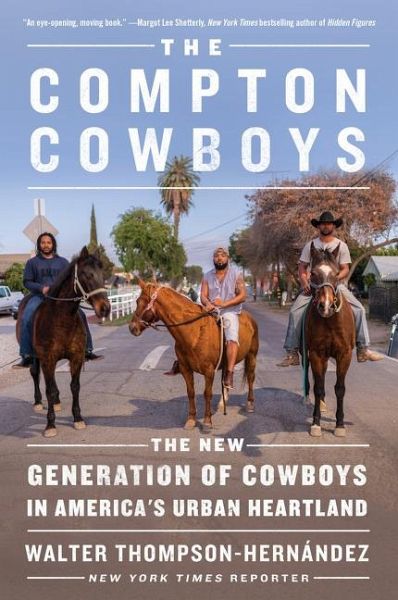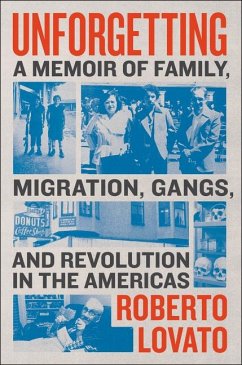Walter Thompson-Hernandez
Broschiertes Buch
The Compton Cowboys
The New Generation of Cowboys in America's Urban Heartland
Versandkostenfrei!
Versandfertig in über 4 Wochen
Weitere Ausgaben:

PAYBACK Punkte
8 °P sammeln!





â Thompson-Hernández's portrayal of Compton's black cowboys broadens our perception of Compton's young black residents, and connects the Compton Cowboys to the historical legacy of African Americans in the west.
Based in Los Angeles, Walter Thompson-Hernández began his career with the New York Times in 2018 and reports for the paper’s multi-media reporting team covering subcultures and off-beat communities around the world. He has also written for NPR, Fusion, The Guardian, Remezcla, and other media outlets, and has reported from six continents and throughout the United States. He attended the University of Portland and received his Master’s degree in Latin American Studies from Stanford University. Before working for the New York Times he was enrolled in the U.C.L.A. Chicano Studies Ph.D. program.
Produktdetails
- Verlag: HarperCollins Publishers Inc
- Seitenzahl: 272
- Erscheinungstermin: 20. April 2021
- Englisch
- Abmessung: 201mm x 132mm x 20mm
- Gewicht: 228g
- ISBN-13: 9780062910615
- ISBN-10: 0062910612
- Artikelnr.: 59982839
Herstellerkennzeichnung
Libri GmbH
Europaallee 1
36244 Bad Hersfeld
gpsr@libri.de
"Thompson-Hernández's portrayal of Compton's black cowboys broadens our perception of Compton's young black residents, and connects the Compton Cowboys to the historical legacy of African Americans in the west. An eye-opening, moving book." - Margot Lee Shetterly, New York Times bestselling author of Hidden Figures
"Walter Thompson-Hernández has written a book for the ages: a profound and moving account of what it means to be black in America that is awe inspiring in its truth-telling and limitless in its empathy. Here is an American epic of black survival and creativity, of terrible misfortune and everyday resilience, of grace, redemption and, yes, cowboys." - Junot Díaz, Pulitzer
"Walter Thompson-Hernández has written a book for the ages: a profound and moving account of what it means to be black in America that is awe inspiring in its truth-telling and limitless in its empathy. Here is an American epic of black survival and creativity, of terrible misfortune and everyday resilience, of grace, redemption and, yes, cowboys." - Junot Díaz, Pulitzer
Mehr anzeigen
prize-winning author of This is How You Lose Her
"With the raw quality of a hand-held documentary, The Compton Cowboys gallops into the origin story of this unique organization and its now-fragile legacy... With the eye of a photographer, [Thompson-Hernández] captures the minute ways a community cedes power to another. Zooming in on granular detail, he fleshes out a neighborhood in all its colors, scents and conversational rhythms... this is a rare, un-sensationalized portrait of a community fighting to reclaim its turf... In words and photographs, Thompson-Hernández reveals a three-dimensionality of people and place that can result only from time, trust and compassion." - Los Angeles Times
"This vivid group portrait of contemporary black cowboys at Richland Farms, in Compton, is a story both of heritage and of urban unrest, gang violence, and confrontations with the police...Their activities, the author shows, sparked a culture clash in the wider community, but they have also revived interest in the black cowboy life style, indelibly captured in the Cowboys' motto: 'Streets raised us. Horses saved us.'" - New Yorker
"New York Times journalist Walter Thompson-Hernández debuts with an inspiring report...[and] succeeds in capturing the redemptive powers of this unique community and the human-animal bonds it fosters. This feel-good profile shines a spotlight on a worthy cause." - Publishers Weekly - Publishers Weekly
"With the raw quality of a hand-held documentary, The Compton Cowboys gallops into the origin story of this unique organization and its now-fragile legacy... With the eye of a photographer, [Thompson-Hernández] captures the minute ways a community cedes power to another. Zooming in on granular detail, he fleshes out a neighborhood in all its colors, scents and conversational rhythms... this is a rare, un-sensationalized portrait of a community fighting to reclaim its turf... In words and photographs, Thompson-Hernández reveals a three-dimensionality of people and place that can result only from time, trust and compassion." - Los Angeles Times
"This vivid group portrait of contemporary black cowboys at Richland Farms, in Compton, is a story both of heritage and of urban unrest, gang violence, and confrontations with the police...Their activities, the author shows, sparked a culture clash in the wider community, but they have also revived interest in the black cowboy life style, indelibly captured in the Cowboys' motto: 'Streets raised us. Horses saved us.'" - New Yorker
"New York Times journalist Walter Thompson-Hernández debuts with an inspiring report...[and] succeeds in capturing the redemptive powers of this unique community and the human-animal bonds it fosters. This feel-good profile shines a spotlight on a worthy cause." - Publishers Weekly - Publishers Weekly
Schließen
Für dieses Produkt wurde noch keine Bewertung abgegeben. Wir würden uns sehr freuen, wenn du die erste Bewertung schreibst!
Eine Bewertung schreiben
Eine Bewertung schreiben
Andere Kunden interessierten sich für














